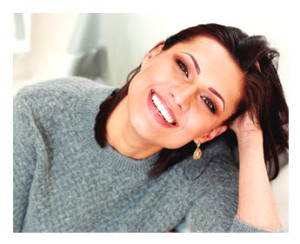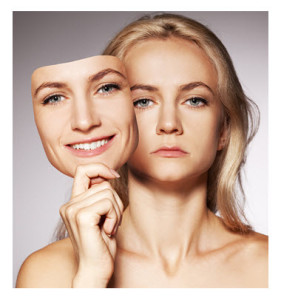Are women too emotional? What’s your immediate (emotional) reaction to that question? Does it prickle? Are you rolling your eyes? Are you nodding in affirmation, and if so — why?
 I couldn’t resist exploring an opinion piece at the Sunday Times that addresses our cultural propensity for labeling women “too” emotional. Sure, we’re content to see our ladies smiling — why wouldn’t we be? — but sad or angry, not so much. In fact, we’re so accustomed to assuming that negative emotions are unwarranted and problematic, we typically medicate the fairer sex into more moderate rhythms of “rational” response.
I couldn’t resist exploring an opinion piece at the Sunday Times that addresses our cultural propensity for labeling women “too” emotional. Sure, we’re content to see our ladies smiling — why wouldn’t we be? — but sad or angry, not so much. In fact, we’re so accustomed to assuming that negative emotions are unwarranted and problematic, we typically medicate the fairer sex into more moderate rhythms of “rational” response.
Let’s just say it: Neutral is the new normal.
Time for a Changing Perspective
In Medicating Women’s Feelings, psychiatrist Julie Holland makes the size of this problem clear:
At least one in four women in America now takes a psychiatric medication, compared with one in seven men. Women are nearly twice as likely to receive a diagnosis of depression or anxiety disorder than men are.
Incensed?
I am. And having been on the (dismissive) receiving end of physicians who slide antidepressants across their desks as a cure-all for everything female — shall I add that I politely declined? — I’m astounded that we continue to accept this behavior.
As Dr. Holland explains our more ragged days of the month, which we generally attribute to our hormonal ups and downs, I couldn’t help the little grin that spread into a sizable smile. She writes:
I tell my patients the thoughts and feelings that come up during this phase are genuine, and perhaps it’s best to re-evaluate what they put up with the rest of the month.
Nice shift in perspective, don’t you think?
Strength in Emotions
I’m a sentimental woman. I cry when I’m feeling joy, when I’m moved, when I’m deeply relieved after a period of worry. I cry when I’m scared, I cry when I’m grieving, I cry more easily on insufficient sleep, and I know precisely when I’m likely to let loose with the tears.
Crying can be cathartic.
More importantly, I am capable of a broad range of emotions, and I have learned to take them all as they come. Perhaps this is in part because I am biologically past the intense need to nurture, to fuss, to nest, to “make peace” at all costs.
There is something to be said for being less nurturing and more focused on one’s own needs. There is something to be said for the value of empathy, in personal, organizational and social environments. There is a great deal of wisdom in Dr. Holland’s noting the crazy — yes I said crazy — and disproportionate amount of antidepressants dispensed to women, what I think of as “be a good girl” meds.
And I am living the realization of what Dr. Holland says here:
Women’s emotionality is a sign of health, not disease; it is a source of power. But we are under constant pressure to restrain our emotional lives. We have been taught to apologize for our tears, to suppress our anger and to fear being called hysterical.
A sign of health, not disease. So let’s stop apologizing.
Happy Face, Sad Face
Shall we revisit notions of female hysteria? Shall we consider the frequency with which women are dismissed by comments like “you’re being too emotional” or “you’re being hysterical?”
Happiness? We’re good with that.
Sadness? Not so much.
Upset? Same deal.
Pass the chemical cocktail.
And anger? We don’t like our women angry. Come on. You know it’s true. We justify the guys when they’re pissed off, and we vilify the women — they should “control themselves.”
But if you ask me, pleasant is one thing, placid another. And passive?
Passivity is a problem, a bad habit, a response to fear, a wall to prevent hurt, a consequence of conditioning. And it’s potentially dangerous, as it tends to encourage handing over control to someone else on a consistent basis. Shouldn’t adults participate in the decisions that concern them?
Keep Emotions Out of the Workplace
Having been part of the traditional corporate workplace for many years, I absorbed this lesson: no emotions in the workplace. Over time, I would say that lightened a little as more women joined teams and the ranks of middle (if not upper) management. Still, tears were a no-no, anger likewise, and “cool, calm and collected” were the watchwords I always kept in mind.
Sure, we’ve made progress since the 80s and 90s. On the other hand, aren’t many women still held to the non-emotional standard? Isn’t the unspoken question “is she too emotional to be an effective leader?”
The Times article reminds us that our (female) biological hard-wiring toward nurturing and empathy serve a purpose. Not only do they serve a purpose when it comes to raising a family, but also in establishing collaborative working relationships.
 Despite my admitted sentimentality, I understand that context and place are relevant. I do know how to compartmentalize. I’m not weepy in the workplace. But that doesn’t mean I haven’t expressed both anger (when appropriate) and passion when I feel strongly.
Despite my admitted sentimentality, I understand that context and place are relevant. I do know how to compartmentalize. I’m not weepy in the workplace. But that doesn’t mean I haven’t expressed both anger (when appropriate) and passion when I feel strongly.
Tasking and Masking
We all need our masks. We need to understand what is appropriate. But appropriate doesn’t equate to apathetic; appropriate shouldn’t mean modeling the men; appropriate shouldn’t require that we medicate our women!
Looking at individual cases. Antidepressants when they are truly warranted. Using common sense. Allowing ourselves to be human.
These are what we need. As much as I value the smile (and have said as much), I fully appreciate the importance of expressing our true emotions.
Another quote from The Times article that makes an essential point:
When we are overmedicated, our emotions become synthetic. For personal growth, for a satisfying marriage and for a more peaceful world, what we need is more empathy, compassion, receptivity, emotionality and vulnerability, not less.
Don’t the lows make us appreciate the highs? Isn’t empathy critical to our relationships?
Let me add this. I’ve known men who did not strangle their emotional responses, but rather, more freely expressed whatever they felt, including their softer side. I always considered that an incredible strength.
You May Also Enjoy
I’ve been on the receiving end of those you’re too emotional comments and that never makes it better. it’s never a constructive comment. I appreciate this perspective toward emotionality and tears. They’re not a weakness and in many cases – don’t need to be medicated.
So true, Barbara. There is nothing constructive in that remark. Quite the opposite.